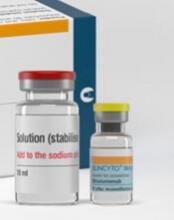The European Commission (EC) has expanded the approved indication for blinatumomab (Blincyto®), a bispecific, CD19-directed, CD3 T-cell engager immunotherapy.
Blinatumomab is now approved as monotherapy for pediatric patients age 1 year or older who have relapsed/refractory, Philadelphia chromosome-negative, CD19-positive B-cell precursor acute lymphoblastic leukemia (ALL).
The patients must have received at least two prior therapies, or they must have relapsed after allogeneic hematopoietic stem cell transplant.
This approval of blinatumomab extends to all countries in the European Union, as well as Norway, Iceland, and Liechtenstein.
The EC previously approved blinatumomab to treat adults with Philadelphia chromosome-negative, relapsed/refractory B-cell precursor ALL.
’205 study
The EC’s approval of blinatumomab in pediatric patients is based on results from the phase 1/2 ’205 study, which were published in the Journal of Clinical Oncology in 2016.
The study included 93 pediatric patients with relapsed/refractory B-cell precursor ALL. Patients received blinatumomab as a continuous intravenous infusion—49 patients in the phase 1 portion of the trial and 44 in phase 2. The patients were followed for 2 years.
There were 4 dose-limiting toxicities (DLTs) during the phase 1 portion of the trial, and 2 DLTs were fatal. Three patients had grade 4 cytokine release syndrome (CRS), one had grade 5 cardiac failure (as well as grade 4 CRS), and one had grade 5 respiratory failure.
Recommended dose
Based on the DLTs, the maximum-tolerated dose of blinatumomab was 15 µg/m2/day, but a step-wise dosage was recommended to reduce the risk of CRS. The recommended dose was 5 μg/m2/day on days 1-7 and 15 μg/m2/day on days 8-28 for cycle 1, and 15 μg/m2/day on days 1-28 for subsequent cycles.
Dose adjustment was possible in case of adverse events (AEs). Patients who responded to blinatumomab but later relapsed had the option to be retreated with blinatumomab.
Seventy patients received at least one infusion of blinatumomab at the recommended dose. The median number of treatment cycles was 1 (range, 1 to 5).
The patients’ median age was 8 years (range, 7 months to 17 years). Forty patients (57%) had undergone allogeneic transplant prior to receiving blinatumomab, and 39 (56%) had refractory disease.
Safety
The most common AEs among patients who received the recommended dose of blinatumomab were pyrexia (80%), anemia (41%), nausea (33%), and headache (30%).
The most frequent grade 3 or higher AEs were anemia (36%), thrombocytopenia (21%), febrile neutropenia (17%), hypokalemia (17%), and neutropenia (17%).
Eight patients developed CRS. Three had grade 3 and one had grade 4 CRS.
Ten patients (14%) had treatment interruptions due to AEs, and 4 (6%) discontinued treatment permanently because of AEs.
Six patients had fatal AEs. Three died after they went on to allogeneic transplant—one of multiorgan failure, one of sepsis, and one of respiratory failure. The three other deaths were due to fungal infection, multiorgan failure, and thrombocytopenia.
Response and follow-up
Among the 70 patients who received the recommended dose of blinatumomab, 27 (39%) achieved a complete response (CR) within the first 2 cycles. Fourteen of these patients (52%) achieved minimal residual disease negativity.
Thirteen of the 27 patients (48%) who achieved a CR went on to receive an allogeneic transplant.
At the end of the 2-year follow-up, 4 of the 27 complete responders were still in remission.
Two of the patients had relapsed but were still alive, three had withdrawn consent (one in CR and two after relapse), three had died in CR after transplant, and 15 had relapsed and died.
Of the 43 patients who did not achieve a CR within the first two treatment cycles, 8 were still alive at the end of the 2-year follow-up.


